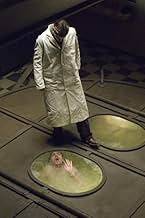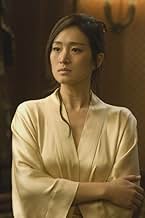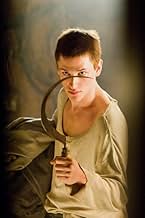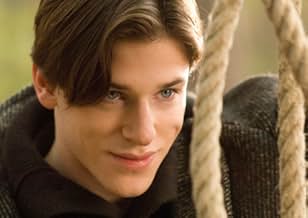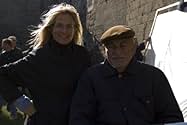Après la mort de ses parents pendant la Seconde Guerre mondiale, le jeune Hannibal Lecter s'installe avec sa belle tante et commence à se venger des barbares responsables de la mort de sa so... Tout lireAprès la mort de ses parents pendant la Seconde Guerre mondiale, le jeune Hannibal Lecter s'installe avec sa belle tante et commence à se venger des barbares responsables de la mort de sa soeur.Après la mort de ses parents pendant la Seconde Guerre mondiale, le jeune Hannibal Lecter s'installe avec sa belle tante et commence à se venger des barbares responsables de la mort de sa soeur.
- Récompenses
- 2 nominations au total
Michelle Wade
- Nanny
- (as Michele Wade)
Avis à la une
As a fan of all the Hannibal Lector films, I was expecting another film I'd enjoy and thinking this would be a terrific character study of man who is one of the most famous fictional killers of all time. What I got instead was more of a simple revenge story than the character study. Oh, yeah, we do learn some background of the famous "Dr. Lector," but not enough of what really made him the weird combination of intellectual and cannibal. Although portraying and having someone in the film label the young adult as "monster," the filmmakers (actually, author Thomas Harris) really made him more of a sympathetic character instead. They took the easiest road, out, too, making an easy target the villains: the Nazis. How often has Hollywood done that, even today 60 years after the conclusion of WWII. What we get is a revenge story of how Lector went from a child captive of the Nazis for a short time, to a medical student in Paris and how he tracked down the Nazis who killed the rest of his family. Of particular incentive to him was the avenging of his sister's death. There is a neat little twist at the ending regarding that but I go into that for spoiler reasons. The best part of the film was the absolutely gorgeous cinematography. This is beautifully filmed, first frame to last. The story is much better in the second half than the first, which has a few parts in which it lags. I'm not quite sure about the credibility of having an Asian aunt raise him, but I also enjoy seeing actress Gong Li. Her relationship with young Hannibal is a strange one. Gaspard Ulliel as Hannibal was okay but certainly not as riveting in the role as the mature Anthony Hopkins was in his three performances. Why a young French actor, who has all the accents that Hopkins doesn't have, would play the role, I don't know. Overall, I'm glad I saw it but, unlike the three other Hopkins' "Lector films," this is one I won't add to my movie collection. However, at least I learned what the most tasty part of the human anatomy is, not that I would ever put that information to use!
Strange opus with a rather complex feedback: I really like certain aspects of the film while others bother me. First of all, I think it's a critical mistake to explain the origins of an imaginary evil character. Indeed, it's always better to confine a reader or a spectator to the darkness so that he's always able to imagine the worst. Moreover, in doing so, we find ourselves in a rather embarrassing situation of being in empathy with Hannibal Lecter: failing to be forgivable, a revenge is always understandable. Despite this rather negative introduction, the actors are excellent including the enigmatic Gaspard Ulliel and the gorgeous Gong Li, and the film enjoys a particularly neat photography.
Designed as a prequel to SILENCE OF THE LAMBS (and MANHUNTER before it), this is a film that aims to show how Hannibal Lecter ended up as the human cannibal that we all know and fear. Many people criticised this film, arguing that familiarity breeds contempt and the more we learn about a killer's background and origin, the less frightening he becomes. They have a point, but they're also missing something: HANNIBAL RISING is a very well made and entertaining movie in its own right. My advice is to forget all about the connections with the later films and just enjoy this film on its own merits.
It's a distinctly European film with a European sensibility and a young, French, unknown lead actor. It has a level of classiness that's not present in many an American film; a sheen of quality that sets it apart from the rest. The opening sequence, set in the latter days of World War 2 and detailing horrific events in Lithuania, is very well handled, full of foreboding, great effects, and sinister actions. It ably sets up the rest of the film, which turns out to be a revenge flick with the added intrigue of having the main character becoming more and more sick and twisted as the movie progresses.
One thing that stands out is the quality of the cast. The unknown Gaspard Ulliel is weird and brilliant as the young killer, and you quite believe he's a sociopath. There's a romantic sub-plot that goes nowhere involving the lovely Gong Li (CURSE OF THE GOLDEN FLOWER) but it does serve to humanise the monster a bit. The ever-reliable Dominic West is also very good as the policeman investigating Hannibal's crimes, although his role is completely extraneous to the thrust of the film. The bad guys, too, are very well cast and all of them thoroughly despicable chaps: Kevin McKidd, Richard Brake, and in particular a cast-against-type Rhys Ifans all make an impact here.
The violence that plays out is entertaining because the villains all deserve it: from the butcher slashed apart with a samurai sword to the guy strangled and eaten, these men are repulsive and their deaths well earned. Another highlight is that the film doesn't focus on the gore, either, not in a repulsive way like HANNIBAL; there's nothing stomach churning here. The cannibalism ends up as a sub-plot, really, not involved with the main film, but that didn't bother me too much. I enjoyed the pacing, the acting and the direction, and found all three of those elements assured and designed to entertain.
It's a distinctly European film with a European sensibility and a young, French, unknown lead actor. It has a level of classiness that's not present in many an American film; a sheen of quality that sets it apart from the rest. The opening sequence, set in the latter days of World War 2 and detailing horrific events in Lithuania, is very well handled, full of foreboding, great effects, and sinister actions. It ably sets up the rest of the film, which turns out to be a revenge flick with the added intrigue of having the main character becoming more and more sick and twisted as the movie progresses.
One thing that stands out is the quality of the cast. The unknown Gaspard Ulliel is weird and brilliant as the young killer, and you quite believe he's a sociopath. There's a romantic sub-plot that goes nowhere involving the lovely Gong Li (CURSE OF THE GOLDEN FLOWER) but it does serve to humanise the monster a bit. The ever-reliable Dominic West is also very good as the policeman investigating Hannibal's crimes, although his role is completely extraneous to the thrust of the film. The bad guys, too, are very well cast and all of them thoroughly despicable chaps: Kevin McKidd, Richard Brake, and in particular a cast-against-type Rhys Ifans all make an impact here.
The violence that plays out is entertaining because the villains all deserve it: from the butcher slashed apart with a samurai sword to the guy strangled and eaten, these men are repulsive and their deaths well earned. Another highlight is that the film doesn't focus on the gore, either, not in a repulsive way like HANNIBAL; there's nothing stomach churning here. The cannibalism ends up as a sub-plot, really, not involved with the main film, but that didn't bother me too much. I enjoyed the pacing, the acting and the direction, and found all three of those elements assured and designed to entertain.
Truly disturbing and succeeds in making you understand why Hannibal Lecter turned out to be the person he became. Not justified, but understandable. Don't leave this out when revisiting the other movies.
I avoided this movie for years. After seeing "Hannibal" I had no interest in seeing how he became the monster he was. Alas, an Amazon Prime membership and down time at work drove me to "Hannibal Rising." I learned that I have a far greater affinity for young Hannibal than old Hannibal. Young Hannibal grew up in WW2 Europe. He went from affluence to fighting for his life due to the war. One particularly tragic event forever changed him.
The actor chosen for Hannibal (Gaspard Ulliel) was excellent. He even had a sinister looking face the way the corners of his mouth curve upward in a Joker-esque manner made him able to sneer with ease. His acting left a little to be desired as his accent (or simply his manner of speaking) seemed forced. Also there was the dialog between him and Lady Murasaki (Li Gong). They constantly spoke in hushed romantic tones as if every word they exchanged was secretive or passionate. It came off as pretentious and grandiose as though they were the two most important or two most passionate people in the world.
If we were to boil it all down, "Hannibal Rising" was a revenge story. Some people are fueled by love, some by hate, others by both. Hannibal was definitely fueled by both and it was his inability or unwillingness to not cross the line that made him Hannibal the cannibal.
The actor chosen for Hannibal (Gaspard Ulliel) was excellent. He even had a sinister looking face the way the corners of his mouth curve upward in a Joker-esque manner made him able to sneer with ease. His acting left a little to be desired as his accent (or simply his manner of speaking) seemed forced. Also there was the dialog between him and Lady Murasaki (Li Gong). They constantly spoke in hushed romantic tones as if every word they exchanged was secretive or passionate. It came off as pretentious and grandiose as though they were the two most important or two most passionate people in the world.
If we were to boil it all down, "Hannibal Rising" was a revenge story. Some people are fueled by love, some by hate, others by both. Hannibal was definitely fueled by both and it was his inability or unwillingness to not cross the line that made him Hannibal the cannibal.
Le saviez-vous
- Anecdotes"Lady Murasaki" (Shikibu Murasaki) is actually the name of an 11th-century Japanese novelist. Her "The Tale of the Genji" is regarded as a masterpiece of Japanese literature. In the book on which this film is based, Lady Murasaki is indeed a descendant of the 11th-century novelist. She and Hannibal even quote "The Tale of the Genji".
- GaffesWorld War II German "dogtags" didn't have the name of the soldier on them. Instead they listed the unit that they were in when the tag was issued, and a serial number.
- Citations
Hannibal Lecter: Rudeness is an epidemic.
- Versions alternativesFor the German retail market a cut version was created (based on the theatrical version) which misses ca. 13 minutes. This version is rated "Not under 16". Theatrical and US-Unrated version are also available with a "Not under 18" rating but have some sales restrictions.
- ConnexionsFeatured in HypaSpace: Épisode #6.25 (2007)
- Bandes originalesPesnya o Staline
Written by Aleksandr Aleksandrov (as A. Alexandrov) and Sergey Alymov (as S. Alymov)
Public Domain
(misspelled as "Pensya o Staline")
Meilleurs choix
Connectez-vous pour évaluer et suivre la liste de favoris afin de recevoir des recommandations personnalisées
Détails
- Date de sortie
- Pays d’origine
- Sites officiels
- Langues
- Aussi connu sous le nom de
- Hannibal, el origen del mal
- Lieux de tournage
- Sociétés de production
- Voir plus de crédits d'entreprise sur IMDbPro
Box-office
- Budget
- 75 000 000 $US (estimé)
- Montant brut aux États-Unis et au Canada
- 27 670 986 $US
- Week-end de sortie aux États-Unis et au Canada
- 13 051 650 $US
- 11 févr. 2007
- Montant brut mondial
- 82 169 884 $US
- Durée
- 2h 1min(121 min)
- Couleur
- Mixage
- Rapport de forme
- 2.35 : 1
Contribuer à cette page
Suggérer une modification ou ajouter du contenu manquant





